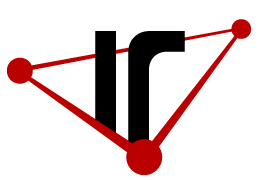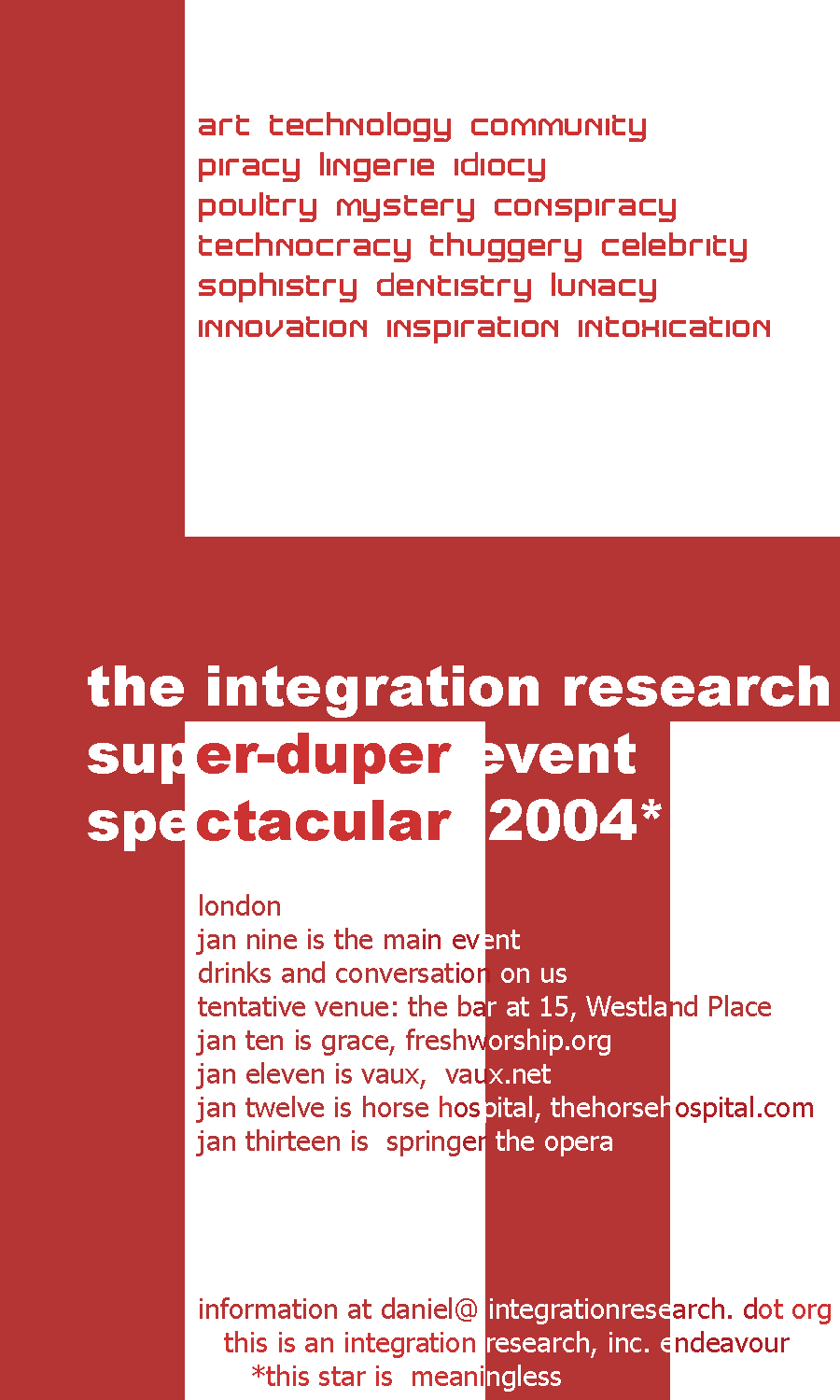
A few days ago I let a domain I’ve owned for around 15 years expire.
Integration Research was a “nonprofit incubator for ideas, processes, and technologies that aid in artistry, personal creative process and community development. We develop software, partner with other software developers, collect knowledge concerning the creative process and nurture spaces both virtual and physical that facilitate various artistic communities.” It was active from 2003-2005 and finally closed its virtual doors in 2006.
Here is a presentation I developed in early 2003 (almost a year before moving to Dallas) defining the very high-level ideas around IR.
While it largely failed to achieve its lofty and far too numerous goals it served many purposes: my first experience with both entrepreneurship and nonprofit management; over a year of very satisfying work with some of the smartest people I’ve ever known; the expansion of my Dallas network and the friendship of many people I still cherish today.
Many of the ideas we explored within the context of IR have been done by others in the years since.
Delicious Monster existed when we started Smart Commons Collection but it has since added sharing to its feature set. Other library management tools have come and gone. The adoption of digitally delivered cultural artifacts and the DRM attached to them has eroded much of the spontaneous sharing that we desired to facilitate. Now we post quotes from our books on Facebook, designed not for discussion but as content for the bolstering of our personal brand.
 When Dan conceived and created Smart Commons, Friendster was probably under 1 million users and MySpace wasn’t even a line of ColdFusion code. His concept of personas (versions of one’s social footprint customized for different audiences) would later be done by Google+ with their circles. We brought it into the IR umbrella, combined it with the Collection concept, and tried to raise investor interest. Unfortunately our nonprofit status did not appeal to the profiteers.
When Dan conceived and created Smart Commons, Friendster was probably under 1 million users and MySpace wasn’t even a line of ColdFusion code. His concept of personas (versions of one’s social footprint customized for different audiences) would later be done by Google+ with their circles. We brought it into the IR umbrella, combined it with the Collection concept, and tried to raise investor interest. Unfortunately our nonprofit status did not appeal to the profiteers.
It turns out personas and circles are too high-level for almost all social software users. Those that desire to customize their online social performance do so on a post-by-post basis, and/or by audience with “lists”. We are many people housed in one body, but we’ll never admit it. And there is no collection of our data that we would segment for certain audiences. It’s again piecemeal and ad-hoc. “Request so-and-so’s relationship status.”
Social software in general has suffered, if you’ll excuse the pun, from the tragedy of the commons, robbing us of quality time in the name of utility, creating increased distance from the other and providing harbor to those with destructive ends in mind. (I finally deleted my Facebook account just yesterday.)
As for the “creation and dissemination” aspects of our activities, the market has taken over and exploded. Technology tools for creatives are more numerous than they have ever been, and show no signs of suffering a reduction in demand. While digital distribution has disrupted the cultural economy, independent artists have embraced the web and leveraged every tool at their disposal to great effect; even many who were not groomed within the “old” system have been able to expand their audience towards a more economically sustainable ends. And new platforms have emerged: YouTube is the dominant cultural platform of the present day. Leanpub and similar online publishing tools are better than anything I ever dreamed up.
I still feel like IR could have been a longer-lasting enterprise had I remained focused on it (as opposed to also starting an art gallery and a web design shop), not been in the throes of divorce, and not bothered with the nonprofit aspect of it. It was a very different time and there was no startup ecosystem in Dallas. Even the valley was relatively quiet then, licking its wounds from the dot-com bubble collapse and leaving the interesting startup work to the Canadians.

Shout out to Joshua Rudd for creating the IR and gallery logos and marks.

We launched in early 2004 with a trip to London, where we had many friends doing interesting things. (I had completely forgotten about Jerry Springer: The Opera.)